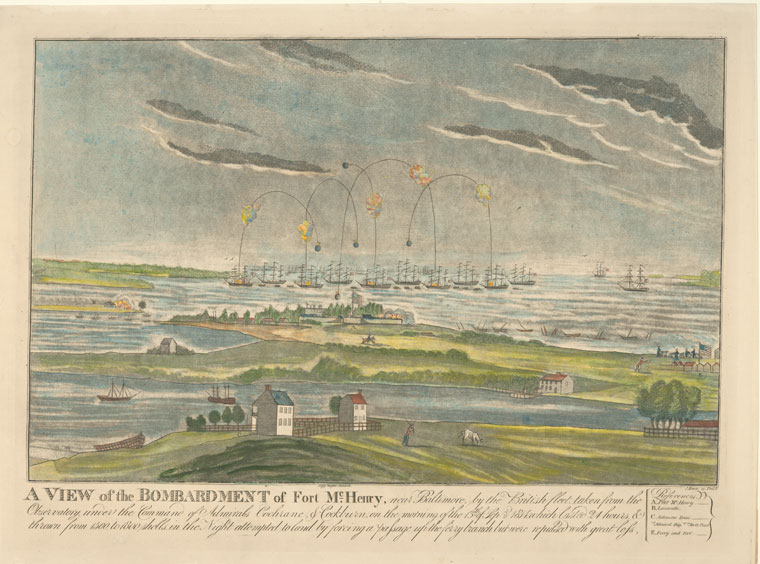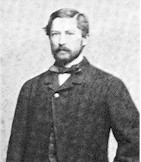Two “Keys” and 47 Years
On September 14, 2014, the nation will pass a milestone anniversary. 200 years prior, Francis Scott Key penned “The Star-Spangled Banner” as a poem, which later, when adapted to music, would be come the United States of America’s national anthem.
The action that Key witnessed was the British bombardment of Fort McHenry, a star-shaped fort that guarded the water approaches to Baltimore, Maryland, named after a Maryland signer of the Constitution and the third Secretary of War, James McHenry.
Throughout the night of September 13, 1814, the fort and its defenders withstood constant shelling from the British fleet, and when dawn broke on September 14th, the flag still fluttered above the ramparts. Coupled with a setback at the battle of North Point in which British General Robert Ross was killed, the Americans, aided by Maryland militia, safely defended the city and harbor.

(courtesy of New York Public Library Digital Collection)
Forty-seven years after Key penned his poem aboard a ship where he had been confined pending the British assault on Fort McHenry, his grandson would also find himself in a similar predicament.
Frank (also commonly referred to as Francis) Key Howard was arrested on September 13, 1861 for his pro-Southern viewpoints as editor of the Baltimore Exchange. His paper had been critical of President Abraham Lincoln’s policies, namely the suspension of the writ of habeas corpus and the declaration of martial law.
Howard would be confined inside Fort McHenry, which would be used primarily as a military prison as the war progressed. Initially, though, it housed arrested pro-Southern (or suspected Confederate sympathizers) from the surrounding area.
With his cell in the second story of the fort, which gained the nortorious nickname as “An American Bastille,” Howard would pen a very eloquent and ironic reflection of his current predicament:
When I looked out in the morning, I could not help being struck by the odd, and not so pleasant a coincidence. On that day, forty-seven years before . . . my grandfather had witnessed the bombardment of Fort McHenry. . . . As I stood upon the very scene of that conflict, could not but contrast my position with his . . . . The flag which he so proudly hailed, I saw waving, at the same place, over the victims of as vulgar and brutal a despotism as modern times have witnessed.

(courtesy of North Carolina War Between the States Sesquicentennial Commission)
Howard would eventually pen a book about his time as a political prisoner inside Fort McHenry, titled “Fourteen Months in the American Bastilles,” completed by December 1862. When it was published by Baltimore publishers in October 1863, the two responsible editors were both arrested for selling the work.
History can be interesting like that: thrusting two Keys (or a Key and Howard, to be more accurate) at one location that underscored the forty-seven years of change between wars.
As the different anniversaries of the War of 1812 and American Civil War coincide, we are afforded an opportunity to look at the similarities and lasting legacies of both conflicts.
The War of 1812 cemented the United States as a sovereign nation and tied up loose ends from the American Revolution. The war provided a measuring stick in which, a short few years later, President James Monroe (who was both Secretary of State and War during the War of 1812) would issue the Monroe Doctrine, establishing American hegemony in the Western Hemisphere. In a twist, the British provided nominal support for this declaration.
With the war’s successful conclusion, people flooded westward, heroes rose to prominence, i.e. Andrew Jackson, and the country and Americans saw the war as a victory for American democracy. On the heels of the war came a period of time classified as the “Era of Good Feelings.”
Yet, in that “Era of Good Feelings” were sown the seeds of discontent. Within a few short years, the country would face a crisis in Missouri that would be averted with the aptly named “Missouri Compromise.” Eventually, compromises would run out and sectional differences would tear the country apart.
During the American Civil War, Fort McHenry went from a beacon of American freedom to a pen holding dissidents against the same flag that Key so fervently hoped would still be waving when dawn broke on September 14, 1814. With the policies of Lincoln—a product of the frontier himself—the United States emerged from “a great civil war, testing whether that nation, or any nation so conceived and so dedicated, can long endure.” By tactics that bent and sometimes temporarily broke his Constitutionally sanctioned powers, Lincoln saved Maryland and, with it, the United States—much like the defenders of Fort McHenry did forty-seven years before.

As we commemorate the American Civil War, let’s not forget to celebrate the history and legacy of the War of 1812: the first Second American Revolution.
*For a schedule of events commemorating the 200th Anniversary of the Star-Spangled Banner click here.
…and let us not forget another connection between Francis Scott Key and the Civil War: In 1859 Key’s son Philip Barton Key was shot and killed by Congressman and future General Daniel Sickles for engaging in an affair with Sickles’s wife. Sickles was acquitted thanks to the first successful use of the temporary-insanity defense argued by his attorney, none other than Edwin Stanton!
Outstanding perspective. Major George Armistead’s (the fort’s commander) nephew was Lew Armistead, of Pickett’s Charge fame. Such are the twists and turns of history.
I love the article, but I think the way you justified the unjustifiable actions of Lincoln (arresting those using their freedom of speech) was a bit silly. Lincoln was good but he made mistakes, such as using Fort McHenry as a prison for innocent people.
Hey Alex,
First, my apologies on the delay in responding, I thought I had and was going through my posts and realized it never uploaded. Technology!
Thank you for reading and enjoying the article. My goal was to try and stay objective with Lincoln, knowing that he had tough decisions to make; stopping the support of the rebellion in Baltimore/Maryland without alienating moderates or eroding support. He did what he thought was necessary, with the suspension of the writ of habeas corpus for example, but in the process he may have seemed to some to have overstepped his presidential roles. But, that is another debate all in itself. He did what he thought was necessary and that leaves us the chance, as history enthusiasts to debate and discuss those actions.
Hope you keep reading the blog and thanks again for the comment, my apologies as well for the lengthy delay in responding, this time I am going to make sure this comment posts!
If you mean Mr. Merryman, I wouldn’t be too upset about “innocent” people being imprisoned. There’s solid evidence that he was involved in destroying rail facilities being used to move United States troops. There’s a difference between being factually “innocent” and being incarcerated without a trial. Phill covers the general issue regarding the tightrope Lincoln had to walk. .